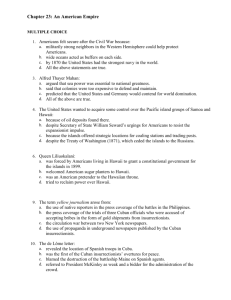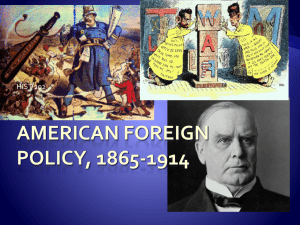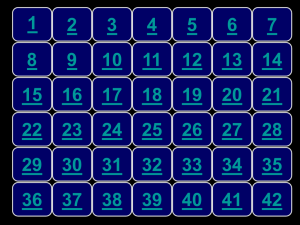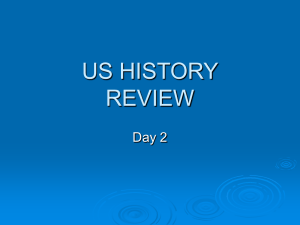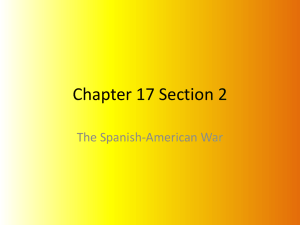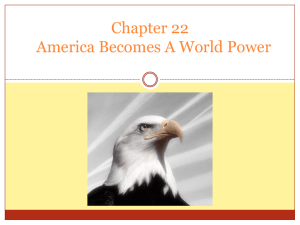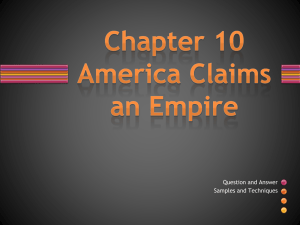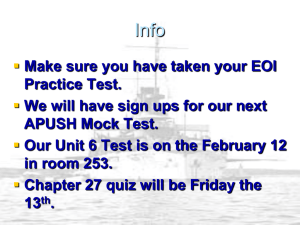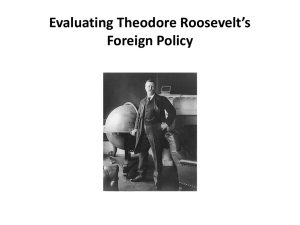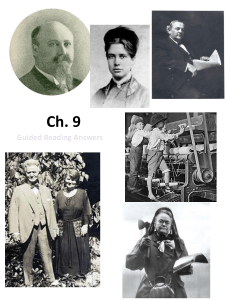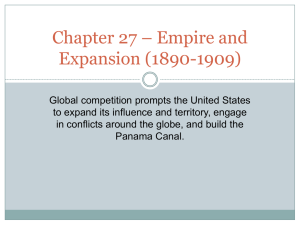Chapter 22 and 23
advertisement
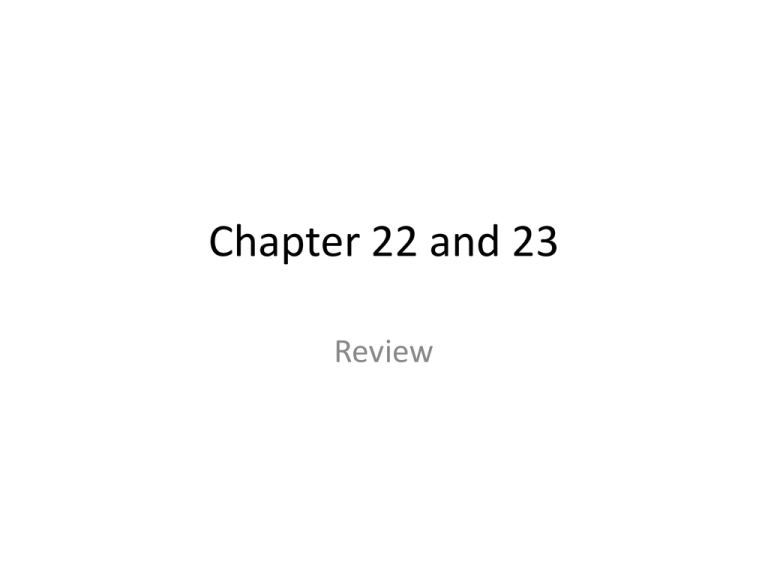
Chapter 22 and 23 Review Question 1 • Which of the following groups was among the most active in promoting American interests abroad? A. Conservationists B. Railroad tycoons C. Socialists D. Protestant ministers Question 2 • William McKinley ordered a battleship into Havana Harbor to protect U.S. citizens and their property. The ship mysteriously exploded, setting off waves of suspicion. What was the name of the battleship? A. Mayflower B. Maine C. Oregon D. Alabama Question 3 • The main reason for the easy U.S. victory in the war with Spain was A. U.S. naval superiority B. U.S. ground forces C. Bad weather D. Unskilled Cuban rebels Question 4 • In the Treaty of Paris, the United States acquired all of the following territory except A. The Philippines B. Guam C. Alaska D. Puerto Rico Question 5 • At President William McKinley’s urging, the U.S. Congress attached to an army appropriation bill the Platt Amendment outlining three conditions for Cuban independence. Which of the following statements was NOT included as a condition? A. Cuba would not be allowed to make treaties with foreign powers B. Cuba’s sugar industry would no longer depend on the U.S. market C. The United States would have broad powers to intervene in Cuban political and economic affairs. D. Cuba would have to sell or lease land to the U.S. for naval stations. Question 6 • The United States was concerned that the actions of the other world powers in China would block its own efforts to open China’s markets to American goods. This concern was based on the actions of Britain, Germany, Japan, Russia, and France—each coveting its own area of China, where it could do all of the following except A. Establish Protestant churches B. Monopolize trade C. Exploit cheap labor D. Establish military bases Question 7 • Who sent “open door” notes to the major world powers asking them to open its spheres of influence to the merchants of other nations, to grant reasonable harbor fees and railroad rates, and to respect China’s sovereignty by enforcing Chinese tariff duties in the territory it controlled? A. Leonard Wood B. James Bryce C. Philander C. Knox D. John Hay Question 8 • Which two countries did Theodore Roosevelt perceive as the chief threats to the Open Door policy in China? A. Australia and Argentina B. Germany and Switzerland C. England and France D. Russia and Japan Question 9 • Who was the first American to earn the Nobel Prize for Peace? A. Linus Pauling B. Henry Kissinger C. Theodore Roosevelt D. Woodrow Wilson Question 10 • Theodore Roosevelt entered into secret negotiations to arrange for peace in East Asia. The compromise resulted in all of the following except A. Japan was awarded the chief prize of Korea and also was allowed to control the southern part of Sakhalin Island, Port Arthur, and the South Manchurian Railroad B. Russia was required to pay Japan a huge indemnity and turned control of Siberia over to Japan C. China’s territorial integrity was protected by inducing the armies of both Russia and Japan to abandon Manchuria D. Japan was favored by perpetuating its control over most of the territories it had won during the brief RussoJapanese War Question 11 • The Mexican Revolution broke out in 1920 when dictator Porfirio Diaz, who had ruled for thirty-four years, was overthrown by democratic forces led by A. Francisco Madero B. Jose Santos Zelaya C. Victoriano Huerta D. Francisco “Pancho” Villa Question 12 • The author of The Influence of Sea Power upon History was A. Theodore Roosevelt B. William McKinley C. Frederick Jackson Turner D. Alfred Thayer Mahan Question 13 • Which president brought the most impressive foreign policy credentials to the White House? A. Theodore Roosevelt B. William McKinley C. William Howard Taft D. Woodrow Wilson Question 14 • When the U.S. annexed Puerto Rico, the intent was to A. Allow Puerto Ricans to govern themselves B. Encourage Puerto Rico to seek statehood C. Rule the island and its inhabitants D. Establish cooperative governance between the U.S. and Puerto Rico Question 15 • U.S. foreign policy in the Western Hemisphere after 1900 was A. Defensive—geared toward limiting European influence B. Isolationist C. Offensive—geared toward expanding American influence D. Never criticized by the U.S. citizens Question 16 • “Yellow journalism” or the “yellow press” A. Featured shocking and sensational stories designed to appeal to a mass audience B. Was rejected by leading newspapermen such as Joseph Pulitzer C. Focused American attention away from the Cuban rebellion at the end of the 19th Century D. Refers to the use of comic strips Question 17 • Theodore Roosevelt’s foreign policy was A. “look before you leap” B. “speak softly and carry a big stick” C. “death before dishonor” D. “Win at all costs” Question 18 • The principles embodied in the Roosevelt corollary were applied to all of the following except A. Hawaii B. Cuba C. Venezuela D. Dominican Republic Question 19 • The Teller Amendment declared A. War on Spain B. That the U.S. would not use war to acquire Cuban territory C. That Cuba could not make treaties with foreign powers D. The independence of the Philippines Question 20 • What event in 1914 precipitated Europe’s descent into war? A. The sinking of the Lusitania B. The British attack o the Chesapeake C. The assassination of a Serbian nationalist D. The assassination of the heir to the AustroHungarian throne Question 21 • The Triple Alliance consisted of alliances between A. Britain, France, and Russia B. France, Italy, and Switzerland C. Germany, Austria-Hungary, and Italy D. Switzerland, Britain, and Germany Question 22 • Which countries aligned themselves as part of the Triple Entente? A. Britain, France, and Russia B. France, Italy, and Switzerland C. Germany, Austria-Hungary, and Italy D. Switzerland, Britain, and Germany Question 23 • Many Americans, especially those with economic and political power, identified more closely with the culture of Britain than they did with the culture of Germany for all the following reasons except A. They shared a common language B. They shared a common ancestry C. They shared a common border D. They shared a commitment to liberty Question 24 • The Zimmerman telegram urged Mexico to A. Negotiate peace with the U.S B. Attack the U.S. in the event of war between the U.S and Germany C. Withdraw from the American Southwest D. Enter the war on the side of the allies Question 25 • President Wilson appeared before the Senate on January 22, 1917, to outline his plans for possible peace. In his speech, he reaffirmed his commitment to a League of Nations. Which of the following was not one of his crucial principles in lasting peace? A. Freedom of the seas B. Disarmament C. Protection of capitalism D. The right of all people to self-determination, democratic self-government, and security against aggression Question 26 • A second Russian Revolution in November 1917 overthrew the liberal, democratic government and brought to power a revolutionary, socialist government under the Bolshevik leader A. Mikhail Gorbachev B. Nicholas II C. Vladimir Lenin D. Joseph Stalin Question 27 • Revenues from taxes provide the government with only about 1/3 of the $33 billion that it ultimately spent on the war. The rest came from the government sale of 30-year bonds, known as A. Doughboy bonds B. U.S. saving bonds C. Liberty bonds D. Allied bonds Question 28 • The manufacture and distribution of alcoholic beverages was banned by the A. 15th Amendment B. 16th Amendment C. 17th Amendment D. 18th Amendment Question 29 • Congress made it illegal to write or utter any statement that could be construed as profaning the flag, the Constitution, or the military with the A. Alien and Sedition Act B. Espionage, Sabotage, and Sedition Acts C. Jones Act D. Wagner Act Question 30 • The initial U.S. policy regarding the European war was to A. Offer immediate support to the Allied Powers B. Offer immediate support to the Central Powers C. Offer to mediate between the two camps D. Pursue a policy of neutrality Question 31 • The Committee on Public Information’s main function was A. To encourage young men to register B. To raise money for the war C. Ensure support for the peace treaty D. Raise the level of patriotism and support for the war Question 32 • The War Industries Board A. Represented Woodrow Wilson’s initial attempts to pursue a decentralized approach to war mobilization B. Possessed complete authority over military and civilian wartime production C. Was criticized by Progressives as inefficient D. Nationalized all industries in the U.S. Question 33 • Most African American soldiers were A. Not permitted to register for the draft B. Killed in the war C. Assigned to all black units and were sent to the front D. Assigned to all black units and not allowed to fight Question 34 • The International Workers of the World and the Socialist Party A. Always supported the war B. Supported the war after U.S. entry C. Helped to staff the Committee on Public Information D. Supported Germany in the war Question 35 • The Treaty of Versailles punished Germany by A. Removing Kaiser Wilhelm II from power B. Placing Germany under the military control of France and England C. Assessing $33 billion in war reparations D. Executing all the nation’s leading officials
